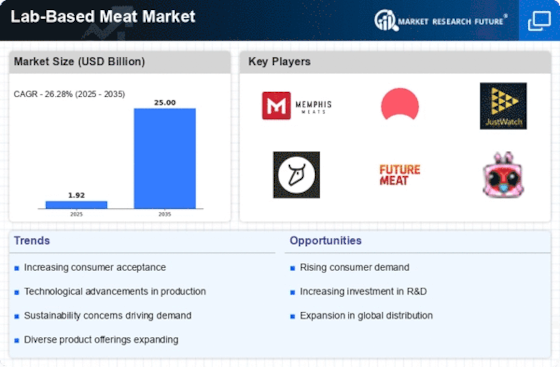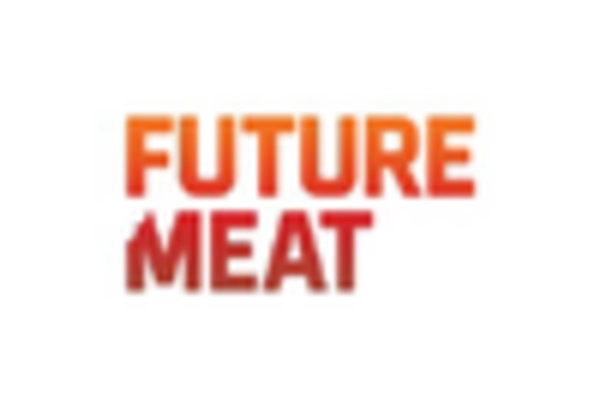- Lab-Based Meat Market By Product Type (USD Billion, 2019-2035)
- Lab-Based Meat Market By Production Method (USD Billion, 2019-2035)
- Cell Culture
- Tissue Engineering
- 3D Bioprinting
- Lab-Based Meat Market By Application (USD Billion, 2019-2035)
- Food Products
- Food Ingredients
- Nutritional Supplements
- Lab-Based Meat Market By Distribution Channel (USD Billion, 2019-2035)
- Online Retail
- Supermarkets
- Restaurants
- Lab-Based Meat Market By Regional (USD Billion, 2019-2035)
- North America
- Europe
- South America
- Asia Pacific
- Middle East and Africa
North America Outlook (USD Billion, 2019-2035)
North America Lab-Based Meat Market by Product Type
Beef
Pork
Chicken
Seafood
North America Lab-Based Meat Market by Production Method Type
Cell Culture
Tissue Engineering
3D Bioprinting
North America Lab-Based Meat Market by Application Type
Food Products
Food Ingredients
Nutritional Supplements
North America Lab-Based Meat Market by Distribution Channel Type
Online Retail
Supermarkets
Restaurants
North America Lab-Based Meat Market by Regional Type
US
Canada
US Outlook (USD Billion, 2019-2035)
US Lab-Based Meat Market by Product Type
Beef
Pork
Chicken
Seafood
US Lab-Based Meat Market by Production Method Type
Cell Culture
Tissue Engineering
3D Bioprinting
US Lab-Based Meat Market by Application Type
Food Products
Food Ingredients
Nutritional Supplements
US Lab-Based Meat Market by Distribution Channel Type
Online Retail
Supermarkets
Restaurants
CANADA Outlook (USD Billion, 2019-2035)
CANADA Lab-Based Meat Market by Product Type
Beef
Pork
Chicken
Seafood
CANADA Lab-Based Meat Market by Production Method Type
Cell Culture
Tissue Engineering
3D Bioprinting
CANADA Lab-Based Meat Market by Application Type
Food Products
Food Ingredients
Nutritional Supplements
CANADA Lab-Based Meat Market by Distribution Channel Type
Online Retail
Supermarkets
Restaurants
Europe Outlook (USD Billion, 2019-2035)
Europe Lab-Based Meat Market by Product Type
Beef
Pork
Chicken
Seafood
Europe Lab-Based Meat Market by Production Method Type
Cell Culture
Tissue Engineering
3D Bioprinting
Europe Lab-Based Meat Market by Application Type
Food Products
Food Ingredients
Nutritional Supplements
Europe Lab-Based Meat Market by Distribution Channel Type
Online Retail
Supermarkets
Restaurants
Europe Lab-Based Meat Market by Regional Type
Germany
UK
France
Russia
Italy
Spain
Rest of Europe
GERMANY Outlook (USD Billion, 2019-2035)
GERMANY Lab-Based Meat Market by Product Type
Beef
Pork
Chicken
Seafood
GERMANY Lab-Based Meat Market by Production Method Type
Cell Culture
Tissue Engineering
3D Bioprinting
GERMANY Lab-Based Meat Market by Application Type
Food Products
Food Ingredients
Nutritional Supplements
GERMANY Lab-Based Meat Market by Distribution Channel Type
Online Retail
Supermarkets
Restaurants
UK Outlook (USD Billion, 2019-2035)
UK Lab-Based Meat Market by Product Type
Beef
Pork
Chicken
Seafood
UK Lab-Based Meat Market by Production Method Type
Cell Culture
Tissue Engineering
3D Bioprinting
UK Lab-Based Meat Market by Application Type
Food Products
Food Ingredients
Nutritional Supplements
UK Lab-Based Meat Market by Distribution Channel Type
Online Retail
Supermarkets
Restaurants
FRANCE Outlook (USD Billion, 2019-2035)
FRANCE Lab-Based Meat Market by Product Type
Beef
Pork
Chicken
Seafood
FRANCE Lab-Based Meat Market by Production Method Type
Cell Culture
Tissue Engineering
3D Bioprinting
FRANCE Lab-Based Meat Market by Application Type
Food Products
Food Ingredients
Nutritional Supplements
FRANCE Lab-Based Meat Market by Distribution Channel Type
Online Retail
Supermarkets
Restaurants
RUSSIA Outlook (USD Billion, 2019-2035)
RUSSIA Lab-Based Meat Market by Product Type
Beef
Pork
Chicken
Seafood
RUSSIA Lab-Based Meat Market by Production Method Type
Cell Culture
Tissue Engineering
3D Bioprinting
RUSSIA Lab-Based Meat Market by Application Type
Food Products
Food Ingredients
Nutritional Supplements
RUSSIA Lab-Based Meat Market by Distribution Channel Type
Online Retail
Supermarkets
Restaurants
ITALY Outlook (USD Billion, 2019-2035)
ITALY Lab-Based Meat Market by Product Type
Beef
Pork
Chicken
Seafood
ITALY Lab-Based Meat Market by Production Method Type
Cell Culture
Tissue Engineering
3D Bioprinting
ITALY Lab-Based Meat Market by Application Type
Food Products
Food Ingredients
Nutritional Supplements
ITALY Lab-Based Meat Market by Distribution Channel Type
Online Retail
Supermarkets
Restaurants
SPAIN Outlook (USD Billion, 2019-2035)
SPAIN Lab-Based Meat Market by Product Type
Beef
Pork
Chicken
Seafood
SPAIN Lab-Based Meat Market by Production Method Type
Cell Culture
Tissue Engineering
3D Bioprinting
SPAIN Lab-Based Meat Market by Application Type
Food Products
Food Ingredients
Nutritional Supplements
SPAIN Lab-Based Meat Market by Distribution Channel Type
Online Retail
Supermarkets
Restaurants
REST OF EUROPE Outlook (USD Billion, 2019-2035)
REST OF EUROPE Lab-Based Meat Market by Product Type
Beef
Pork
Chicken
Seafood
REST OF EUROPE Lab-Based Meat Market by Production Method Type
Cell Culture
Tissue Engineering
3D Bioprinting
REST OF EUROPE Lab-Based Meat Market by Application Type
Food Products
Food Ingredients
Nutritional Supplements
REST OF EUROPE Lab-Based Meat Market by Distribution Channel Type
Online Retail
Supermarkets
Restaurants
APAC Outlook (USD Billion, 2019-2035)
APAC Lab-Based Meat Market by Product Type
Beef
Pork
Chicken
Seafood
APAC Lab-Based Meat Market by Production Method Type
Cell Culture
Tissue Engineering
3D Bioprinting
APAC Lab-Based Meat Market by Application Type
Food Products
Food Ingredients
Nutritional Supplements
APAC Lab-Based Meat Market by Distribution Channel Type
Online Retail
Supermarkets
Restaurants
APAC Lab-Based Meat Market by Regional Type
China
India
Japan
South Korea
Malaysia
Thailand
Indonesia
Rest of APAC
CHINA Outlook (USD Billion, 2019-2035)
CHINA Lab-Based Meat Market by Product Type
Beef
Pork
Chicken
Seafood
CHINA Lab-Based Meat Market by Production Method Type
Cell Culture
Tissue Engineering
3D Bioprinting
CHINA Lab-Based Meat Market by Application Type
Food Products
Food Ingredients
Nutritional Supplements
CHINA Lab-Based Meat Market by Distribution Channel Type
Online Retail
Supermarkets
Restaurants
INDIA Outlook (USD Billion, 2019-2035)
INDIA Lab-Based Meat Market by Product Type
Beef
Pork
Chicken
Seafood
INDIA Lab-Based Meat Market by Production Method Type
Cell Culture
Tissue Engineering
3D Bioprinting
INDIA Lab-Based Meat Market by Application Type
Food Products
Food Ingredients
Nutritional Supplements
INDIA Lab-Based Meat Market by Distribution Channel Type
Online Retail
Supermarkets
Restaurants
JAPAN Outlook (USD Billion, 2019-2035)
JAPAN Lab-Based Meat Market by Product Type
Beef
Pork
Chicken
Seafood
JAPAN Lab-Based Meat Market by Production Method Type
Cell Culture
Tissue Engineering
3D Bioprinting
JAPAN Lab-Based Meat Market by Application Type
Food Products
Food Ingredients
Nutritional Supplements
JAPAN Lab-Based Meat Market by Distribution Channel Type
Online Retail
Supermarkets
Restaurants
SOUTH KOREA Outlook (USD Billion, 2019-2035)
SOUTH KOREA Lab-Based Meat Market by Product Type
Beef
Pork
Chicken
Seafood
SOUTH KOREA Lab-Based Meat Market by Production Method Type
Cell Culture
Tissue Engineering
3D Bioprinting
SOUTH KOREA Lab-Based Meat Market by Application Type
Food Products
Food Ingredients
Nutritional Supplements
SOUTH KOREA Lab-Based Meat Market by Distribution Channel Type
Online Retail
Supermarkets
Restaurants
MALAYSIA Outlook (USD Billion, 2019-2035)
MALAYSIA Lab-Based Meat Market by Product Type
Beef
Pork
Chicken
Seafood
MALAYSIA Lab-Based Meat Market by Production Method Type
Cell Culture
Tissue Engineering
3D Bioprinting
MALAYSIA Lab-Based Meat Market by Application Type
Food Products
Food Ingredients
Nutritional Supplements
MALAYSIA Lab-Based Meat Market by Distribution Channel Type
Online Retail
Supermarkets
Restaurants
THAILAND Outlook (USD Billion, 2019-2035)
THAILAND Lab-Based Meat Market by Product Type
Beef
Pork
Chicken
Seafood
THAILAND Lab-Based Meat Market by Production Method Type
Cell Culture
Tissue Engineering
3D Bioprinting
THAILAND Lab-Based Meat Market by Application Type
Food Products
Food Ingredients
Nutritional Supplements
THAILAND Lab-Based Meat Market by Distribution Channel Type
Online Retail
Supermarkets
Restaurants
INDONESIA Outlook (USD Billion, 2019-2035)
INDONESIA Lab-Based Meat Market by Product Type
Beef
Pork
Chicken
Seafood
INDONESIA Lab-Based Meat Market by Production Method Type
Cell Culture
Tissue Engineering
3D Bioprinting
INDONESIA Lab-Based Meat Market by Application Type
Food Products
Food Ingredients
Nutritional Supplements
INDONESIA Lab-Based Meat Market by Distribution Channel Type
Online Retail
Supermarkets
Restaurants
REST OF APAC Outlook (USD Billion, 2019-2035)
REST OF APAC Lab-Based Meat Market by Product Type
Beef
Pork
Chicken
Seafood
REST OF APAC Lab-Based Meat Market by Production Method Type
Cell Culture
Tissue Engineering
3D Bioprinting
REST OF APAC Lab-Based Meat Market by Application Type
Food Products
Food Ingredients
Nutritional Supplements
REST OF APAC Lab-Based Meat Market by Distribution Channel Type
Online Retail
Supermarkets
Restaurants
South America Outlook (USD Billion, 2019-2035)
South America Lab-Based Meat Market by Product Type
Beef
Pork
Chicken
Seafood
South America Lab-Based Meat Market by Production Method Type
Cell Culture
Tissue Engineering
3D Bioprinting
South America Lab-Based Meat Market by Application Type
Food Products
Food Ingredients
Nutritional Supplements
South America Lab-Based Meat Market by Distribution Channel Type
Online Retail
Supermarkets
Restaurants
South America Lab-Based Meat Market by Regional Type
Brazil
Mexico
Argentina
Rest of South America
BRAZIL Outlook (USD Billion, 2019-2035)
BRAZIL Lab-Based Meat Market by Product Type
Beef
Pork
Chicken
Seafood
BRAZIL Lab-Based Meat Market by Production Method Type
Cell Culture
Tissue Engineering
3D Bioprinting
BRAZIL Lab-Based Meat Market by Application Type
Food Products
Food Ingredients
Nutritional Supplements
BRAZIL Lab-Based Meat Market by Distribution Channel Type
Online Retail
Supermarkets
Restaurants
MEXICO Outlook (USD Billion, 2019-2035)
MEXICO Lab-Based Meat Market by Product Type
Beef
Pork
Chicken
Seafood
MEXICO Lab-Based Meat Market by Production Method Type
Cell Culture
Tissue Engineering
3D Bioprinting
MEXICO Lab-Based Meat Market by Application Type
Food Products
Food Ingredients
Nutritional Supplements
MEXICO Lab-Based Meat Market by Distribution Channel Type
Online Retail
Supermarkets
Restaurants
ARGENTINA Outlook (USD Billion, 2019-2035)
ARGENTINA Lab-Based Meat Market by Product Type
Beef
Pork
Chicken
Seafood
ARGENTINA Lab-Based Meat Market by Production Method Type
Cell Culture
Tissue Engineering
3D Bioprinting
ARGENTINA Lab-Based Meat Market by Application Type
Food Products
Food Ingredients
Nutritional Supplements
ARGENTINA Lab-Based Meat Market by Distribution Channel Type
Online Retail
Supermarkets
Restaurants
REST OF SOUTH AMERICA Outlook (USD Billion, 2019-2035)
REST OF SOUTH AMERICA Lab-Based Meat Market by Product Type
Beef
Pork
Chicken
Seafood
REST OF SOUTH AMERICA Lab-Based Meat Market by Production Method Type
Cell Culture
Tissue Engineering
3D Bioprinting
REST OF SOUTH AMERICA Lab-Based Meat Market by Application Type
Food Products
Food Ingredients
Nutritional Supplements
REST OF SOUTH AMERICA Lab-Based Meat Market by Distribution Channel Type
Online Retail
Supermarkets
Restaurants
MEA Outlook (USD Billion, 2019-2035)
MEA Lab-Based Meat Market by Product Type
Beef
Pork
Chicken
Seafood
MEA Lab-Based Meat Market by Production Method Type
Cell Culture
Tissue Engineering
3D Bioprinting
MEA Lab-Based Meat Market by Application Type
Food Products
Food Ingredients
Nutritional Supplements
MEA Lab-Based Meat Market by Distribution Channel Type
Online Retail
Supermarkets
Restaurants
MEA Lab-Based Meat Market by Regional Type
GCC Countries
South Africa
Rest of MEA
GCC COUNTRIES Outlook (USD Billion, 2019-2035)
GCC COUNTRIES Lab-Based Meat Market by Product Type
Beef
Pork
Chicken
Seafood
GCC COUNTRIES Lab-Based Meat Market by Production Method Type
Cell Culture
Tissue Engineering
3D Bioprinting
GCC COUNTRIES Lab-Based Meat Market by Application Type
Food Products
Food Ingredients
Nutritional Supplements
GCC COUNTRIES Lab-Based Meat Market by Distribution Channel Type
Online Retail
Supermarkets
Restaurants
SOUTH AFRICA Outlook (USD Billion, 2019-2035)
SOUTH AFRICA Lab-Based Meat Market by Product Type
Beef
Pork
Chicken
Seafood
SOUTH AFRICA Lab-Based Meat Market by Production Method Type
Cell Culture
Tissue Engineering
3D Bioprinting
SOUTH AFRICA Lab-Based Meat Market by Application Type
Food Products
Food Ingredients
Nutritional Supplements
SOUTH AFRICA Lab-Based Meat Market by Distribution Channel Type
Online Retail
Supermarkets
Restaurants
REST OF MEA Outlook (USD Billion, 2019-2035)
REST OF MEA Lab-Based Meat Market by Product Type
Beef
Pork
Chicken
Seafood
REST OF MEA Lab-Based Meat Market by Production Method Type
Cell Culture
Tissue Engineering
3D Bioprinting
REST OF MEA Lab-Based Meat Market by Application Type
Food Products
Food Ingredients
Nutritional Supplements
REST OF MEA Lab-Based Meat Market by Distribution Channel Type
Online Retail
Supermarkets
Restaurants


















Leave a Comment